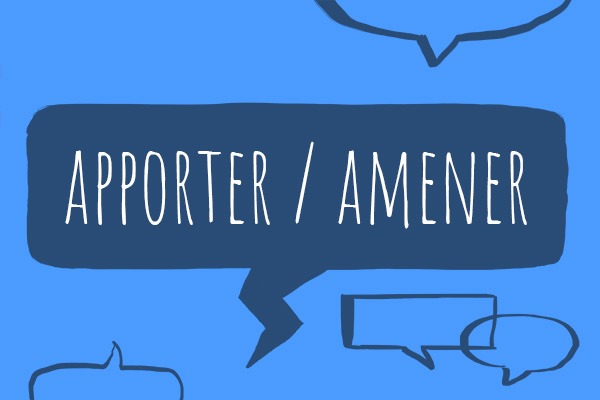Welcome back to our French word of the week blog! In this edition, we’re going slightly off-piste to offer you not just one, but two words – apporter and amener.
Take a listen to their pronunciations using the audio clips below – firstly for apporter…:
…and then for amener:
The reason why we want to look at these words together is that they’re a pair of verbs which learners often get mixed up. They both mean the same thing in English, but we need to make sure we’re choosing the right verb when speaking or writing in French:
There doesn’t appear to be a clear distinction, but the nuance arises depending on what or who you are bringing along. You usually need to use:
- Apporter when talking about bringing an object along with you.
- Amener when talking about bringing a person along with you.
While apporter is a regular -er verb (covered on our grammar pages for the present tense, the imperfect tense and present subjunctive), amener has some complexities like an accent change in the present tense, among others. For a closer look, you can study the verb tables for apporter and amener.
Let’s see how they compare in different scenarios. We’ll start with examples of apporter in use:
Est-ce que tu peux apporter du pain ? Can you bring some bread along?
Mon fils m’a apporté ces belles fleurs. My son brought me these beautiful flowers.
J’imagine que tout le monde apportera les mêmes livres. I suppose that everyone will bring the same books.
Tout au long de l’année dernière, le facteur apportait le courrier à huit heures du matin. For the whole of last year, the postman brought the post at eight in the morning.
Next, we’ll look at the types of scenarios you might come across for the verb amener. Note the accent changes in some conjugations, as mentioned earlier:
Je n’amène pas ma sœur parce qu’elle n’aime pas le théâtre. I’m not bringing my sister because she doesn’t like the theatre.
Vous amèneriez vos parents s’ils étaient disponibles ? Would you bring your parents if they were free?
Maman m’a dit que nous amenons nos cousins à l’école aujourd’hui. Mum told me that we’re bringing our cousins along to school today.
Dis-moi ce qui t’a amené. Tell me what brought you here.
Ce train vous amènera jusque chez moi. This train will take/bring you right to my house.
We hope that our blog has brought you a better understanding of these two similar verbs. And we certainly hope we’ve done enough to bring you back here again for another word of the week!
Written by Holly Tarbet, freelance copywriter and editor.
All opinions expressed on this blog are those of the individual writers, and do not necessarily reflect the opinions or policies of Collins, or its parent company, HarperCollins.



